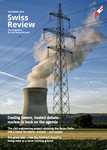“Swiss Review”: Mr Wyder, you are in the final stages of your book on “100 years of the OSA”. The book is set for publication at the beginning of August. During your research, did you come across facts that despite being Director for many years you were not aware of?
Rudolf Wyder: Most definitely. Even though I was Director of the OSA for a long period, there were many gaps in its history which I wanted to fill in, out of personal interest as much as anything. There were periods never dealt with historically. What was the organisation’s role at the beginning – during the First World War? And also, more importantly, during the Second World War? These questions had never been answered before.
Where did you find the information for the book?
I started with the OSA’s annual reports from 1919. The Federal Council’s reports and dispatches and parliamentary records were also important. The OSA also has an extensive archive at the Swiss Federal Archives.
How did the OSA come to be founded by the New Helvetic Society (NHS) 100 years ago?
Patriotism was the main reason behind the establishment of the OSA. Intellectuals who feared that Switzerland could fall apart founded the New Helvetic Society in 1914. They watched with concern how German-speaking Switzerland and French-speaking Switzerland sided with the nations of their respective languages during the war. That could have meant the end for Switzerland. The founders of the New Helvetic Society opposed this trend through patriotism embracing all of Switzerland which also sought to include the Swiss Abroad. The first New Helvetic Society groups were established abroad in 1916, the Committee of the Swiss Abroad was set up in 1917 and a secretariat for the Swiss Abroad was founded two years later. A functioning organisation has existed ever since then.
What tasks did the OSA actually perform?
Its priorities were establishing ties between the Swiss Abroad and Switzerland and providing information about the nation’s position as a neutral state. The OSA then gradually also addressed the particular issues of the Swiss Abroad. From 1919, for example, it supported the calls of the NHS group in Athens for the opening of an embassy in Greece.
The OSA initially idealised the Swiss Abroad. They were portrayed as heroic figures. Why?
The Swiss Abroad were meant to be role models for the Swiss as intrepid pioneers and, above all, patriots. You see, they came from French-speaking and German-speaking Switzerland as well as from Ticino. But abroad they primarily saw themselves as simply Swiss. They were presented as model patriots as part of the effort to prevent the nation from falling apart.
Where did the Swiss Abroad typically head to in 1916?
Switzerland experienced a large wave of emigration from the late 19th century – even if we exclude the First World War from 1914 to 1918. The destination countries were largely the same as they are today. A large number of migrants moved to a country within Europe. However, they were not even recorded in the statistics in the beginning as these only included those boarding ships for the USA or Australia.
A fascinating perception of home and abroad …
Indeed, the authorities did not initially take account of the large Swiss communities in France and Germany. They were only included in the statistics on the Swiss Abroad from 1926 onwards.
Are there significant differences between emigrants then and now?
A major difference is that the early emigrants generally left and never came back. Just imagine, a letter from Australia took four weeks to arrive in Switzerland back then. There was no internet for information or communication and travel was much more difficult. Very few people therefore returned. The nature of the Swiss diaspora is completely different today. It has moved much closer to Switzerland. The world has become a smaller place with distance effectively reduced to time difference. Many more Swiss are therefore returning to their native land.
Have the tasks of the OSA changed over the course of time?
The tools and types of activity have obviously altered but the three key duties have remained the same – providing services for the Swiss Abroad, communication and representing the interests of the Swiss Abroad in Switzerland. This last has become much more significant over the past 20 years.
Have there been times when the role of the OSA has been questioned?
Doubt has never actually been cast on its right to exist. There have been times when the OSA has had to tighten its belt so much that questions have been raised as to whether it could continue to perform its duties. There have sometimes also been internal challenges where individual groups of Swiss Abroad have criticised the organisation’s work. For example, in the 1970s and 1980s a group vehemently argued that the OSA needed to be structured differently, effectively becoming a state body and directly electing the Council of the Swiss Abroad.
What is the relationship like between the OSA and the 750 or so Swiss societies worldwide?
It is largely informal. There is only a regular exchange with certain highly active societies, and obviously with the large umbrella organisations in Europe. An important point is that the members of the Committee of the Swiss Abroad have been elected by the Swiss societies since 1959.
The Swiss Abroad have been able to take part in elections and referenda by postal vote since 1992. Federal government’s duty to provide information for the Swiss Abroad on voting proposals has since been enshrined in law. “Swiss Review”, published by the OSA, serves to fulfil this duty. How do you see the role of the “Review” in terms of shaping political opinion today?
“Swiss Review” remains vitally important. It is the only medium that reaches all Swiss registered abroad making them aware of their rights and duties – in particular, how they can participate politically. This remains crucial in the internet age. Any information can, of course, be obtained online but you firstly have to know what you are looking for. In contrast, “Swiss Review” is delivered to readers. Federal government has a clearly defined duty of provision in this regard.
What do you see as the major challenges facing the OSA in the near future?
The OSA has made a significant contribution towards ensuring we have a solid foundation for policy on the Swiss Abroad today in the broadest sense. The Swiss Abroad Act has existed since last year, and there are also various sectoral laws governing key aspects. Their further development is nevertheless an ongoing task. In my view, the main challenge facing the organisation is working with the authorities to find a strategy for the increasing mobility of the Swiss. Mobility must be made easier. The OSA must also face up to developments in communication. The third major challenge to my mind is that there is still not enough recognition of the potential of the Swiss Abroad in terms of innovation and networks in Switzerland. Switzerland must reflect upon how better use can be made of the tremendous asset that its diaspora abroad represents.













Comments